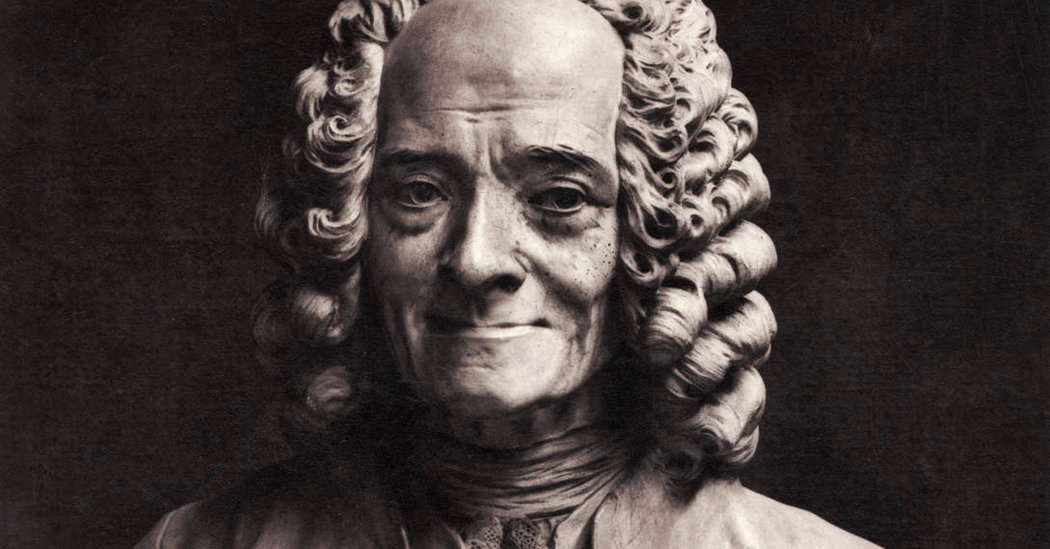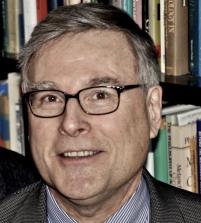Politics and Priestcraft: Oh, Where’s Our Voltaire?
In our postmodern, global, and increasingly divided society, few thin threads of shared conviction seem to bind us together
 In our postmodern, global, and increasingly divided society, few thin threads of shared conviction seem to bind us together. One of those spindly threads has been a rejection by many people of our Enlightenment heritage, which fueled democratic revolutions, helped to shape the US Declaration of Independence and our Constitution, and, at its best, ignited a drive for emancipation, both hither and yon. Everyone knows the criticisms: racism, emancipation limited to certain peoples, colonial projects, the supposed moral and spiritual vacancy of the public square demanded by enlightened reason, that same reason really just the self-projection and self-justification of men, patriarchy and sexism, repressive tolerance, the expansion of global capitalism to tyrannize the poor, world wars, and the endangerment of the planet. Well, fair enough! But this Sightings is about an Enlightenment motif that is sadly missing in our public life, and dangerously so. Call this a “non-sighting” of the Enlightenment’s philosophes and their wit and satire against those politicians and priests—of all religions—bent on duping “we the people” and thereby upending democratic sovereignty. It’s a matter of fanaticism and tyranny of the mind. The question is: where’s our Voltaire?
In our postmodern, global, and increasingly divided society, few thin threads of shared conviction seem to bind us together. One of those spindly threads has been a rejection by many people of our Enlightenment heritage, which fueled democratic revolutions, helped to shape the US Declaration of Independence and our Constitution, and, at its best, ignited a drive for emancipation, both hither and yon. Everyone knows the criticisms: racism, emancipation limited to certain peoples, colonial projects, the supposed moral and spiritual vacancy of the public square demanded by enlightened reason, that same reason really just the self-projection and self-justification of men, patriarchy and sexism, repressive tolerance, the expansion of global capitalism to tyrannize the poor, world wars, and the endangerment of the planet. Well, fair enough! But this Sightings is about an Enlightenment motif that is sadly missing in our public life, and dangerously so. Call this a “non-sighting” of the Enlightenment’s philosophes and their wit and satire against those politicians and priests—of all religions—bent on duping “we the people” and thereby upending democratic sovereignty. It’s a matter of fanaticism and tyranny of the mind. The question is: where’s our Voltaire?
Here is the first, and I think most glaring, case in point. John Fea of Messiah College wrote an op-ed for Religion News Service (May 18, 2019) titled “Why a $45 Trump prayer coin is no joke.” It’s a sighting of what the Enlightenment wits called “priestcraft.” (Priestcraft—to be differentiated from the liturgical acts priests and pastors routinely do—refers, on my understanding, to the use of “religious” means to secure power and to control people.) If you haven’t heard, various conservative Christians, in an act of pure priestcraft, have drummed up the idea that President Trump is a modern day King Cyrus commissioned by God to re-Christianize America, as if America was ever so thoroughly Christian in the first place. Fea notes that “a charismatic preacher named Lance Wallnau appeared on the program of disgraced televangelist Jim Bakker to hawk a Donald Trump/King Cyrus gold coin. He claimed that the coin can be used as a ‘point of contact’ between Christians and God as they pray for the re-election of Trump in 2020.” My goodness, for a mere $45 you too can own this holy talisman to connect you with God, and it’s authenticated by a TV preacher to boot. Such folderol is rife in the religious world, of course. Beads, bones, bracelets, and bands are the stuff of lived religion. (You could go through the alphabet to note each letter with its own talismans.) But so too is preying (not praying) on the desperate, the lonely, or those confused and losing hope.
Such priestly, predatory actions were the target of Voltaire’s wit and that of other Enlightenment philosophes as well. For all of his gleaming faults, too many to recount here, Voltaire campaigned vigorously against superstition and fanaticism. In The Ignorant Philosopher, he wrote, “Of all the systems which men have invented upon this Divinity, which, then, shall I embrace? Not one, without it be that of adoring him.” The same person has a settled awareness of the limitations of the human mind. When priests and preachers peddle trinkets and coins as a “point of contact” with God or the gods, the Enlightened are called to keep things honest and humble. Adoration of God, not a $45 coin, is at issue. But where today is our Voltaire? Have careful, honest, and thinking believers abandoned their posts? Why are there no sightings of them?
Politicians can also dabble in priestcraft. The mere mention of the states Alabama and Missouri should say it all. Their shrill voices, left and right, scurry through social media. Carrie Sheffield, a conservative and founder of Bold, a digital news network, argued in a recent CNN piece, “Alabama’s Abortion Law Addresses an Urgent Human Rights Issue” (May 17, 2019), that “If we believe human life is infinitely valuable, then how a pregnancy begins, even through rape or incest, is irrelevant. A preborn human life is at stake.” She even intimates that unlike decisions about the end of life, abortions are not as carefully considered! (Here is righteousness with a cruel face.) Yet Americans that do believe human life is “infinitely valuable” (whatever that may mean) can also condone war and capital punishment. What secret knowledge of human worth do the Alabama anti-abortion politicians hold, all twenty-five men who passed the bill? On the so-called left, there are outbursts of rage; cries about the insults of the “Right”; claims that the Alabama legislators will live forever in infamy; and a flood of emails and media posts asking one to stand with MoveOn.org. Others rightly note that ardent convictions about “right to life” are hollow and hypocritical when schools are defunded, healthcare is denied, and food deserts abound in our cities.
Don’t be mistaken, I stand resolutely with the right of women to make determinations about their bodies and reproductive capacities. I also find deeply troubling the crass nature of our public discourse. But my judgment is not the issue. The point is that charges about “infinite value” or “an eternity of infamy” are rhetorical tropes analogous to coins, bones, and beads. They are cheap means for acquiring political power. Cornel West put it better: “To be an intellectual really means to speak a truth that allows suffering to speak.” Speak a truth, not fueling the fire, so that those who suffer can speak and be heard: women who have been raped, those who must make agonizing decisions, and also the truly tragic nature of an abortion. How else is a democracy actually to work if there is no truth-telling?
So, our unenlightened age is a time and a republic that seemingly lacks the wit and honesty of the philosophes. Preachers and politicians, left, center, and right, too often engage in priestcraft, unchallenged except by others who practice the same art. Or so it appears.
One last case, and, in fact, an actual “sighting” of an “enlightened” voice! In the most recent print issue of The Atlantic (June 2019), James Carroll, author of some twenty books, penned a searing criticism of the Catholic Church, “To Save the Church, Dismantle the Priesthood.” The title of the article says it all, really. His truth-telling on behalf of the victims of a particularly sinister aspect of priestcraft—sexual abuse—is as damning as Voltaire’s. “Clericalism, with its cult of secrecy, its theological misogyny, and its hierarchical power, is at the root of Roman Catholic dysfunction” (79). Carroll is not anti-Christian or anti-Catholic. Quite the contrary in fact. He will not allow the clericalism of the Church, with predatory priests and complicit bishops, destroy his faith. The people—not the hierarchy—are the Church. He rips the veil off clericalism and priestcraft to reveal it for what it is.
Priestcraft can weaponize coins and beads as well as words and concepts, like “infinite value” or “eternal infamy.” It can fuel secrecy, misogyny, and hatred even in the most public forums of social media. Friedrich Nietzsche, on this point a good philosophe, would say that it is driven by ressentiment, that is, feelings of hatred and envy that cannot be acted on and are therefore transmuted into self-abasement or, in the case of priestcraft, wily ways to gain and keep power. If that is the case, then, priestcraft within a democracy usurps the sovereignty of “we the people.” Denis Diderot, one of the other great philosophes, is reputed to have said—in admittedly blunt and dramatic words—“Man will never be free until the last king is strangled with the entrails of the last priest.”
Those words are no doubt too crass for our public discourse. Nevertheless, we do need to have the truth of conviction to combat priestcraft in all its forms, subtle and crude, and so reclaim some, though (rightly) perhaps not all, of our Enlightenment heritage. At stake is our freedom as a people, religious or not, and, for religious folks, clarity about what really deserves adoration. At least this is what a “non-sighting” of Enlightened social criticism seems to suggest. In Immanuel Kant’s words: “Sapere Aude. Dare to think for yourself.”
Image: A bust of the French philosopher Voltaire.
 Author, William Schweiker (PhD’85), is the Edward L. Ryerson Distinguished Service Professor of Theological Ethics at the Divinity School. Author, William Schweiker (PhD’85), is the Edward L. Ryerson Distinguished Service Professor of Theological Ethics at the Divinity School. |
Works Cited
Voltaire, "The Ignorant Philosopher," in The Best Known Works of Voltaire (Blue Ribbon Books, 1927), 445.
Cornel West, "Chekhov, Coltrane, and Democracy: Interview by David Lionel Smith," in The Cornel West Reader (Civitas Books, 1998).
Sightings is edited by Joel Brown, a PhD student in Religions in America at the Divinity School. Sign up here to receive Sightings via email. You can also follow us on Facebook and Twitter.


